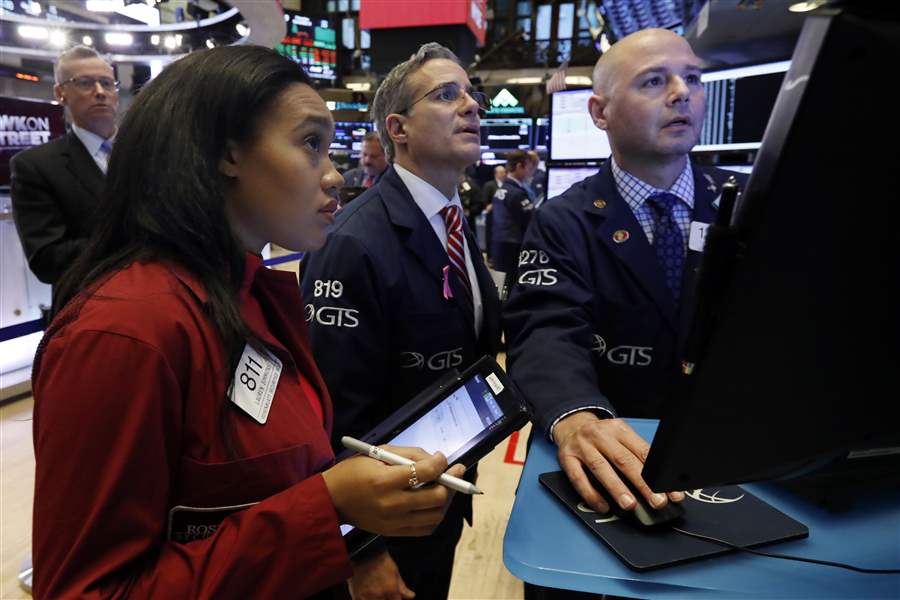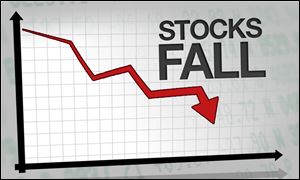
Falling oil prices drag down markets
11/8/2018
Trader Lauren Simmons, left, woks with specialists Lauren Simmons on the floor of the New York Stock Exchange, Thursday, Nov. 8, 2018.
ASSOCIATED PRESS
NEW YORK — Stocks in the U.S. slipped Thursday as the ninth consecutive drop in crude oil prices hurt energy companies. U.S. markets were coming off huge gains the day before.
U.S. crude oil has now slumped more than 20 percent since early October, meeting Wall Street’s definition of a “bear market.”
Government fuel stockpiles have steadily expanded, pushing supplies higher, and the U.S. issued waivers to a number of countries that buy oil from Iran. That allows those countries to keep importing Iranian oil in spite of renewed sanctions on that country.
Most other groups of stocks finished little changed. Banks made the largest gains. The Federal Reserve left interest rates where they are, but suggested it plans to keep raising rates in response to the strong U.S. economy.

RELATED: Searchable stock index
After its steep plunge in October, the S&P had risen for six of the seven days ending on Wednesday. Stocks started sinking last month because investors worried that the Fed was going to raise interest rates to the point they slowed down economic growth. But John Lynch, chief investment strategist at LPL Research, said he doesn’t think that’s going to happen and that the Fed will stop raising rates in 2019.
“We do not believe they will be as aggressive as many fear,” he said. “We still don’t have anything approaching the wage pressures that have historically scared the Fed.”
The S&P 500 index shed 7.06 points, or 0.3 percent, to 2,806.83 after it jumped 2.1 percent Wednesday. The Dow Jones Industrial Average inched up 10.92 points to 26,191.22.
The Nasdaq composite dipped 39.87 points, or 0.5 percent, to 7,530.88 after a 2.6 percent surge a day earlier. The Russell 200 index of smaller-company stocks fell 3.95 points, or 0.2 percent, to 1,578.21.
Benchmark U.S. crude oil fell 1.6 percent to $60.67 a barrel in New York. On Oct. 3 it closed at $76.41, the highest level in almost four years.
Brent crude lost 2 percent to $70.65 a barrel in London. Brent crude is the standard for international oil prices and it has also fallen sharply over the last five weeks.
Exxon Mobil fell 1.6 percent to $81.71 and ConocoPhillips gave up 4.5 percent to $119.36.
Bond prices edged lower. The yield on the 10-year Treasury note rose to 3.24 percent, near its highest level this year, from 3.23 percent. The Federal Reserve left interest rates where they are, but suggested it plans to keep raising them in response to the strong U.S. economy. The Fed has raised its key rate eight times since late 2015 and is expected to do so again in December, with several more increases to follow.
Bank of America rose 1.2 percent to $28.87 and M&T Bank added 1.2 percent to $167.37.
The Fed has been raising rates to prevent inflation from getting out of hand. Lynch, of LPL, said that inflation isn’t going to get much stronger because wages aren’t going to grow much faster than they currently are. He said factors like the retirement of more Baby Boomers, global competition, and slower economic growth in the U.S. will all limit increases in pay.
Chipmaker Qualcomm had a strong fourth quarter, but for the current period it’s projecting revenue of $4.5 billion to $5.3 billion, far below the $5.6 billion analysts expected, according to FactSet. Its stock lost 8.2 percent to $58.05.
Apple stopped making royalty payments to Qualcomm following a dispute between the companies, and later decided to stop using Qualcomm modems in some of its products. Qualcomm said both of those changes have hurt its results.
D.R. Horton, one of the largest homebuilders, fell 9 percent to $34.22 after its earnings and sales fell short of Wall Street forecasts. The company said rising home prices and mortgage rates are affecting demand. That exact combination has been weighing on home sales and the stocks all year. PulteGroup fell 3.5 percent to $24.23 and Lennar lost 2.5 percent to $41.90.
Wynn Resorts dropped 13.1 percent to $99.02 after the casino operator said its business in Macau has slowed down recently.
Stocks climbed Wednesday after the midterm elections generally went the way investors thought they would. The Democrats took control of the House of Representatives while the Republicans held on to a majority in the Senate. That means that politics appears that much less likely to crowd out the performance of the strong U.S. economy.
In other commodities trading, wholesale gasoline was little changed at $1.64 a gallon. Heating oil dropped 3.1 percent to $2.17 a gallon. Natural gas edged down to $3.54 per 1,000 cubic feet.
Gold fell 0.3 percent to $1,225.10 an ounce. Silver lost 1 percent to $14.42 an ounce. Copper slipped 0.7 percent to $2.74 a pound.
The dollar rose to 113.96 yen from 113.34 yen. The euro fell to $1.1363 from $1.1455.
Germany’s DAX lost 0.4 percent and the British FTSE 100 picked up 0.3 percent. The CAC 40 in France was 0.1 percent lower.
The Japanese Nikkei 225 rallied 1.8 percent and South Korea’s Kospi rose 0.7 percent. In Hong Kong, the Hang Seng added 0.3 percent.